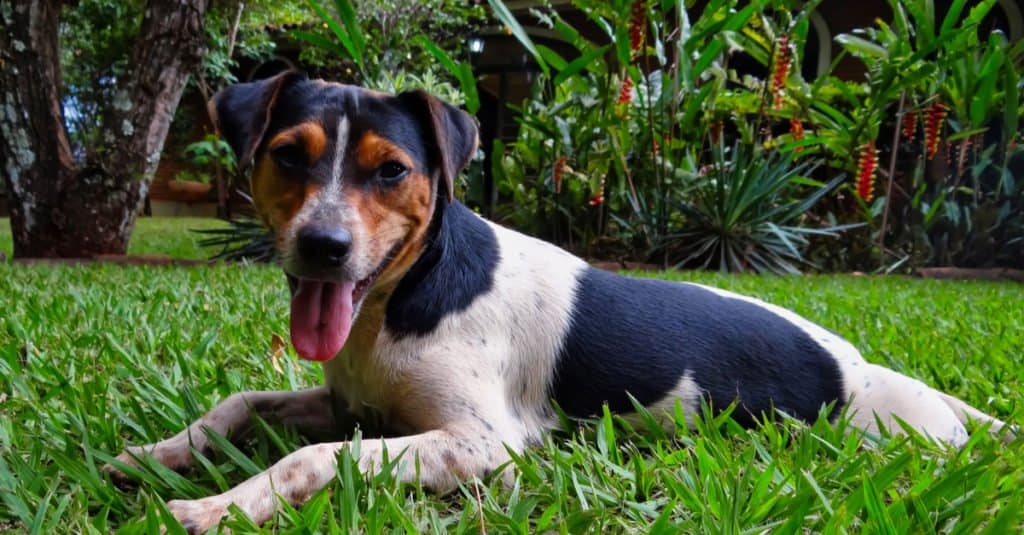Brazilian Terrier
Canis lupus
Brazilian Terriers are mix puppies and one of only two uniquely Brazilian breeds.
Advertisement
Brazilian Terrier Scientific Classification
- Kingdom
- Animalia
- Phylum
- Chordata
- Class
- Mammalia
- Order
- Carnivora
- Family
- Canidae
- Genus
- Canis
- Scientific Name
- Canis lupus
Read our Complete Guide to Classification of Animals.
Brazilian Terrier Conservation Status
Brazilian Terrier Facts
- Fun Fact
- Brazilian Terriers are mix puppies and one of only two uniquely Brazilian breeds.
- Temperament
- Intelligent, playful and energetic
- Training
- Should be trained from an early age due to their hyperactive nature
- Diet
- Omnivore
- Average Litter Size
- 10
- Common Name
- Brazilian Terrier
- Slogan
- Small body and tri-coloured coat!
- Group
- Terrier
Brazilian Terrier as a Pet:
- General Health
- Energy Level
- Shedability
- Trainability
- Intelligence
- Tendency to Chew
- Size
- Family and kid friendliness
- Yappiness / Barking
- High
- Separation Anxiety
- Moderate
- Preferred Temperature
- Warm climate
- Exercise Needs
- Moderate
- Friendly With Other Dogs
- High
- Pure bred cost to own
- $800
- Dog group
- Terrier
- Male weight
- 15-22 lbs
- Female weight
- 15-22 lbs
This post may contain affiliate links to our partners like Chewy, Amazon, and others. Purchasing through these helps us further the A-Z Animals mission to educate about the world's species.
View all of the Brazilian Terrier images!
Once grown, Brazilian Terriers became working dogs on coffee and rubber plantations where they proved themselves outstanding rodent hunters.
In the late 19th century, it was common for Brazilian students to complete their education in the UK. Experts speculate that this is how Jack Russell Terriers first came to be imported into the country. These Jack Russells were mated with Miniature Pinschers, Fox Terriers, and Chihuahuas, creating mixed puppies with distinctive triangular faces and tri-color coats.
See all of our expert product reviews.
Once grown, these mixed puppies became working dogs on coffee and rubber plantations, where they proved themselves outstanding rodent hunters. In 2007, the Fédération Cynologique Internationale (FCI) recognized these terriers as a distinctive breed dubbed the Brazilian Terrier.

3 Pros and Cons of Owning a Brazilian Terrier
| Pros! | Cons! |
| They’re friendly and playful: Once they get to know you they understand the ground rules. These dogs are an excellent companion choice for senior citizens living alone as well as for families. Their engaging personalities make them a good choice for first-time dog owners, too. | They bark a lot: They are barkers, particularly when they’re bored. While this makes them excellent watchdogs, it does limit their ability to live in apartment-sized living spaces or accompany you on “Take Your Dog to Work” days. If you live in an urban setting, a Brazilian Terrier might not be the right choice for a canine companion. |
| They’re highly intelligent: They are extremely smart and can be stubborn. So firmness and consistency must be important parts of any training regimen. Training satisfies their need for mental stimulation, so the earlier you begin training and socializing them, the happier they will be. Brazilian Terriers do especially well with canine agility and obedience sports training . | They were bred to hunt: If your other household pets include rabbits, hamsters, gerbils or guinea pigs, Brazilian Terriers are not the dog for you. On Brazilian plantations where this breed was first developed, these dogs were bred to hunt small prey. Even with training, this drive may be difficult to contain. |
| They’re easily groomed: They have short, wiry-haired coats, which means their grooming can easily be accomplished at home. They’re medium shedders, so they’re not hypoallergenic; individuals with serious dog allergies will want to steer clear of this breed. Brush them occasionally, scrub their teeth at least once a day, bathe them once a week, and they’ll do fine. | They can trigger allergies: They are not hypoallergenic. They are medium shedders, and their shedding can trigger allergic reactions in individuals who are sensitive to dogs. |

Brazilian Terriers are easier to train than Jack Russell terriers because on Brazilian plantations, they worked as part of a pack, so they’re more open to cooperative behaviors. These dogs do well with circuit training.
©Pedro Turrini Neto/Shutterstock.com
History and Origins
The historical background of the Brazilian terrier is uncertain. It is believed that several types of terriers were transported to Brazil from Europe in the 1800s and may have been the original ancestor of the breed. The original dogs could have included fox, parson, and Jack Russell terriers.
Others theorize that the breed came from Spanish dogs that were brought to Brazil during the Iberian Union. They think the original dogs could have included Ratonero Valenciano and Ratonero Bodeguero Andaluz.
Health and Entertainment for your Brazilian Terrier
See all of our expert product reviews.

Brazilian Terriers have unknown origins but are thought to be of Spanish or European descent.
©fvolu/Shutterstock.com
Size and Weight
Male Brazilian Terriers vary from 14 to 16 inches in height. Females are slightly smaller at 13 to 15 inches. Therefore, the optimal weight for either sex is between 15 and 22 pounds. Most Brazilian Terrier puppies reach their adult size by 12 months of age.
| Height (Male): | 14 to 16 inches tall |
| Height (Female): | 13 to 15 inches tall |
| Weight (male): | 15 to 22 pounds |
| Weight (female): | 15 to 22 pounds |
Common Health Issues
Since Brazilian Terriers are not the product of selective breeding, they have what biologists refer to as “hybrid vigor.” They’re hardy and robust, showing a few of the signs of selective inbreeding, like eye problems and tracheal collapse that can affect Jack Russell Terriers.
Be sure that your pet gets plenty of exercise and that they maintain a healthy weight. Ultimately, this will help to ensure they live a long life. It is not uncommon to find Brazilian Terriers who are 15 years old or older.
Temperament and Behavior
While a Brazilian Terrier’s personality is not typically described as “laid-back,” you’ll find this canine can be quite easy-going when its needs for exercise are met.
These dogs work and play well with others, and while they like to bark, their behavior is seldom aggressive. However, they bark to attract the attention of their pack members (you and your family) when they’re feeling neglected. Common Brazilian Terrier traits include intelligence, friendliness, assertiveness, and fearlessness.

Brazilian Terriers like to run and chase and play spirited games of fetch.
©fvolu/Shutterstock.com
How To Take Care of Brazilian Terrier
As long as you factor in their need for exercise, Brazilian Terriers are relatively low-maintenance. They are not prone to hereditary illnesses that may necessitate frequent trips to the vet.
Since puppies are curious and assertive, it’s smart to begin leash training and obedience as early as possible so there’s no question in your Brazilian Terrier puppy’s mind that you are the boss.
The Best Dog Food
Since they are relatively small dogs, the Brazilian Terrier has a high metabolism. Therefore, it’s important to feed your Brazilian Terrier a diet that’s specifically formulated for small dogs; this food typically has a higher concentration of high-energy fats than other types of dog food.
Conversely, Brazilian Terrier puppies should be on a small dog puppy diet which contains more nutrients as well as calories per bite to fill their smaller tummies. Feed your dog twice a day, and make sure he or she always has access to fresh water.
This is a remarkably healthy breed that will likely live a long and healthy life eating any quality dog food.
But at A-Z Animals, we’ve decided the best dog food for Brazilian Terriers is Wellness CORE Small Breed Dry Dog Food with Wholesome Grains, High Protein Dog Food.
There are few health conditions associated with this breed, but this food may help rule them out even further. Free of fillers, this turkey and chicken diet supplies your dog with tons of protein to fuel the endless fun. The phosphorus and calcium content help your Brazilian Terrier build and maintain strong bones and cartilage, and the taurine doubly helps keep both the eyes and heart in good condition. As a bonus, the probiotics yield smooth digestion.
See if your dog thrives on Wellness CORE Small Breed High Protein dog food, available on Chewy or Amazon.
- Chicken and turkey meal, deboned chicken recipe for small dog breeds
- Levels of taurine for heart health
- Promotes lean muscles and lean body mass
- No legumes, potatoes, fillers, artificial colors or flavors
Maintenance and Grooming
Under normal circumstances, you will not have to visit a groomer at all if a Brazilian Terrier becomes your animal companion. They’re not hypoallergenic, so they will shed enough to require regular brushing and maybe follow-up vacuuming. However, your carpets are unlikely to become coated in dog hair. Unless they roll in mud or some other offensive substance when you exercise them, they won’t need a bath more often than once a week.
Like all dogs, you should brush their teeth at least once a day and clip their nails regularly. Seasonal flea and tick treatments are also recommended since, optimally, your dog will be spending a lot of time outside.
Training
Start obedience training early with your Brazilian Terrier so that he or she doesn’t develop any misconceptions about who the leader of the pack is. Brazilian Terriers are easier to train than Jack Russell terriers because on Brazilian plantations, they work as part of a pack, so they’re more open to cooperative behaviors. These dogs do well with circuit training.

Brazilian Terriers are relatively low-maintenance. They are not prone to hereditary illnesses that may necessitate frequent trips to the vet.
©Pawel Rajtar/Shutterstock.com
Exercise
In order to live happily with a Brazilian Terrier, you must commit to exercising your dog regularly. A slow walk around the block will not suffice: This dog requires at least one period of vigorous exercise every day. These dogs like to run and chase and play spirited games of fetch.
While their temperaments are nowhere as high-strung as Jack Russell Terriers, Brazilian Terriers can turn snappish and aggressive. Therefore, be sure they get adequate exercise.
Brazilian Terrier Puppies
Unneutered Brazilian Terrier females go into heat approximately every six months. Gestations last 60 to 64 days. Litter sizes typically range from four to six puppies. Surprisingly, at eight weeks of age, your Brazilian Terrier puppy is old enough for simple five-to-ten-minute training sessions.
Make sure to end training sessions on an up note with plenty of praise and a treat because your Brazilian Terrier puppy wants to please.

Brazilian Terrier puppies should be maintained on a small dog puppy diet which contains more nutrients as well as calories per bite to fill their smaller tummies. Feed your dog twice a day, and make sure he or she always has access to fresh water.
©Rafael Goes/Shutterstock.com
With Children
Kids and Brazilian Terriers both like to romp, so they’re a natural team. Therefore, as long as your child knows better than to pull ears or tails, it’s a match made in heaven. Still, if your child is younger than five, it’s best to chaperon his or her interactions with this family pet. Brazilian Terriers were bred to be hunting dogs, so they do have a well-developed prey drive.
Similar Dogs
Dog breeds similar to the Brazilian terrier include the Jack Russell Terrier, the Fox Terrier, and the Portuguese Podengo.
- Jack Russell Terriers: Jack Russell Terriers are lively, clever, and tenacious little dogs that were bred to go underground. Their coats, which can be either smooth or rough, are short and come in a variety of colors, including white, white, and tan, or tricolor white, black, and tan.
- Fox Terriers: Fox Terriers were first bred in 18th century Britain to flush foxes out of hiding places during hunts. Their bodies are compact and muscular to facilitate speed and agility. Smooth Fox Terriers have short, predominantly white coats, while Wire-Haired Fox Terriers have a bristly double coat. They are perfect companions for anyone who lives an active lifestyle because they are friendly, energetic, and have remarkable staying power.
- Chihuahuas: Never tell a Chihuahua she’s a small dog; she just won’t believe you. These feisty descendants of the royal dogs of pre-Columbian Mexico may deign to share rulership of your home with you, but they’ll never give up the throne. They’re small dogs that seldom weigh more than six pounds, which makes them ideal for apartment living. Their coats come in a variety of colors, patterns, and textures. Chihuahuas are very intelligent and respond well to firm, consistent, and affectionate training.
Popular Names
Popular names for Brazilian Terriers include:
- Bento
- Leonardo
- Nuno
- Branca
- Luzia
Brazilian Terrier FAQs (Frequently Asked Questions)
Are Brazilian Terriers herbivores, carnivores, or omnivores?
Brazilian Terriers are Omnivores, meaning they eat both plants and other animals.
What Kingdom do Brazilian Terriers belong to?
Brazilian Terriers belong to the Kingdom Animalia.
What class do Brazilian Terriers belong to?
Brazilian Terriers belong to the class Mammalia.
What phylum to Brazilian Terriers belong to?
Brazilian Terriers belong to the phylum Chordata.
What family do Brazilian Terriers belong to?
Brazilian Terriers belong to the family Canidae.
What order do Brazilian Terriers belong to?
Brazilian Terriers belong to the order Carnivora.
What genus do Brazilian Terriers belong to?
Brazilian Terriers belong to the genus Canis.
What type of covering do Brazilian Terriers have?
Brazilian Terriers are covered in Hair.
How many babies do Brazilian Terriers have?
The average number of babies a Brazilian Terrier has is 10.
What is an interesting fact about Brazilian Terriers?
Brazilian Terriers have small bodies and tri-colored coats!
What is the scientific name for the Brazilian Terrier?
The scientific name for the Brazilian Terrier is Canis Lupus.
How much do Brazilian Terriers cost to own?
You can expect to spend around $800 if you’re buying a Brazilian Terrier puppy from a reputable breeder. Your initial visit to the vet for things like vaccinations, microchipping and neutering will probably set you back an additional $250. Don’t forget the other items your new puppy will need like food bowls, crates, leashes, bedding and toys! These will vary in cost, depending upon where you purchase them.
Monthly food costs for your Brazilian Terrier will run around $75 a month, and you can expect to incur costs of around $600 a year for ongoing vet bills, licenses and training.
Are Brazilian Terriers good with kids?
Yes! Brazilian Terriers love to play—and so do children. With a Brazilian Terrier, your child will have a playmate who never gets tired. Like all dogs, though, it’s best not to leave them untended with children.
What is the average lifespan of a Brazilian terrier?
The average lifespan of a Brazilian Terrier is between 12 and 14 years. It’s not uncommon, though, to meet Brazilian Terriers who are 15 years old or older.
Thank you for reading! Have some feedback for us? Contact the AZ Animals editorial team.
Sources
- , Available here: https://www.wisdompanel.com/en-us/breed-library/terrier-brazileiro
- , Available here: https://animalsadda.com/brazilian-terrier/
- , Available here: https://www.dogzone.com/breeds/brazilian-terrier/#health
- , Available here: https://www.smalldogplace.com/Brazilian-terrier.html


















